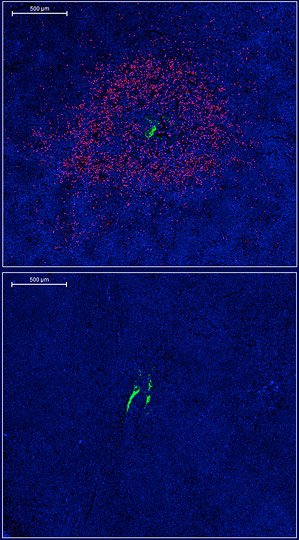Device Tests Drugs on a Tumor That’s Still in the Body
A device that injects different drugs into tumors to test their efficacy could soon help doctors tailor treatment regimens to a patient’s cancer.

Seattle’s Presage Biosciences is developing the technology, which injects minute amounts of different cancer drugs into a tumor while it is still in the body. Once the tumor is removed, doctors can examine it to see which drugs killed its cancerous cells. The drugs that work best within the tumor can then be given in larger doses intravenously to fight the cancer throughout the body.
The technology could address a big challenge for oncologists: finding a quick, effective treatment that doesn’t cause patients undue suffering. An oncologist who gives a patient an anti-cancer drug today has no guarantee that it will work. In many cases, the drug will cause only harmful side effects, says Jim Olson, a pediatric neuro-oncologist and scientist at Seattle Children’s Hospital and the Fred Hutchinson Cancer Research Center. “I am sick of writing prescriptions for kids to give them experimental therapies that have a 94 percent chance of failing and that will more than likely make them sick,” says Olson, who is also the founder of Presage.
The new device uses several needles to inject small quantities of drugs into a tumor through the skin—a “fifth of a raindrop,” says Olson—into a living tumor. The “soaker hose”-like needles thread narrow columns of drug through the tumor; once the tumor is removed, it is sliced into thin sections which can be stained for markers of drug activity.
The researchers are working on a handheld disposable version of the device and recently launched a clinical study of the technology.
The device could be helpful beyond personalizing cancer treatments. Drug companies could use it to study experimental new treatments and in combinations of drugs, a hot area of cancer drug research (see “EmTech: The Future of Cancer Treatment” and “Nanoparticles Could Lead to Stronger Drugs, Fewer Side Effects for Patients”).
Pharmaceutical company Millennium is using Presage’s technology to test cancer drug combinations on solid tumors in lab animals to identify more effective treatments. “The Presage technology is definitely unique,” says Mark Manfredi, senior director of cancer pharmacology at Millennium. Being able to test drugs in the body is a huge advantage, he says. “We are able to then pursue a broad set of questions with the Presage technology faster than a traditional study where the drug is delivered systemically.”
Keep Reading
Most Popular
Large language models can do jaw-dropping things. But nobody knows exactly why.
And that's a problem. Figuring it out is one of the biggest scientific puzzles of our time and a crucial step towards controlling more powerful future models.
How scientists traced a mysterious covid case back to six toilets
When wastewater surveillance turns into a hunt for a single infected individual, the ethics get tricky.
The problem with plug-in hybrids? Their drivers.
Plug-in hybrids are often sold as a transition to EVs, but new data from Europe shows we’re still underestimating the emissions they produce.
Google DeepMind’s new generative model makes Super Mario–like games from scratch
Genie learns how to control games by watching hours and hours of video. It could help train next-gen robots too.
Stay connected
Get the latest updates from
MIT Technology Review
Discover special offers, top stories, upcoming events, and more.